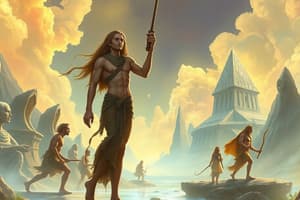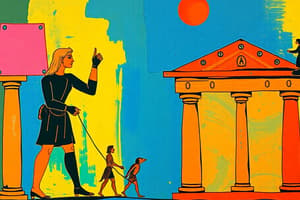Podcast
Questions and Answers
During which period did the Zhou dynasty introduce bronze casting and the writing system known as Shang Script?
During which period did the Zhou dynasty introduce bronze casting and the writing system known as Shang Script?
- China (1600 BCE to 221 BCE) (correct)
- Mesopotamia (4500 BCE to 1600 BCE)
- India (2600 BCE to 500 BCE)
- Classical Period (500 BCE to 500 CE)
Which civilization gave birth to Hinduism, Buddhism, and Jainism, along with advancements in urban planning and social systems?
Which civilization gave birth to Hinduism, Buddhism, and Jainism, along with advancements in urban planning and social systems?
- Mesopotamia (4500 BCE to 1600 BCE)
- China (1600 BCE to 221 BCE)
- Classical Period (500 BCE to 500 CE)
- India (2600 BCE to 500 BCE) (correct)
Which period saw the rise of philosophers like Socrates and Plato, contributing to the development of philosophy, drama, and politics?
Which period saw the rise of philosophers like Socrates and Plato, contributing to the development of philosophy, drama, and politics?
- China (1600 BCE to 221 BCE) (correct)
- Middle Ages (500 CE to 1400 CE)
- The Modern Era
- The Renaissance (14th-17th centuries)
Flashcards are hidden until you start studying
Study Notes
Unraveling the Past: A Glimpse into Human History
Throughout the tapestry of human existence, we've been weaving stories of triumphs, struggles, and discoveries that continue to unfold. As we embark on this exciting journey through the annals of time, let's delve into the fascinating and ever-evolving world of human history.
Paleolithic Period (2.6 million to 10,000 BCE)
The Paleolithic era, or "Old Stone Age," marked the dawn of human life. Early humans, such as Homo habilis and Homo erectus, began to develop hand axes and other tools, enabling them to adapt to their environments and hunt for food. Eventually, around 30,000 BCE, our species Homo sapiens emerged, and the stage was set for human civilization.
Neolithic Period (10,000 BCE to 4,500 BCE)
The Neolithic, or "New Stone Age," brought forth the agricultural revolution. Humans began to cultivate crops and raise livestock, leading to more stable food sources, permanent settlements, and complex social structures. This period also ushered in the domestication of animals and the invention of pottery and weaving.
Ancient Civilizations
Soon, several ancient civilizations flourished:
- Egypt (3100 BCE to 332 BC): The Egyptians built monumental structures like the pyramids, developed a writing system (hieroglyphics), and established a sophisticated system of governance.
- China (1600 BCE to 221 BCE): The Zhou dynasty introduced bronze casting, the invention of iron weapons, and the writing system known as Shang Script. Over time, China rose to become the world's first civilization.
- India (2600 BCE to 500 BCE): The Indus Valley Civilization and the Vedic Period gave birth to Hinduism, Buddhism, and Jainism, as well as innovations in urban planning and complex social systems.
- Mesopotamia (4500 BCE to 1600 BCE): The Sumerians and Babylonians laid the groundwork for modern law codes, literature, and scientific advancements such as the invention of cuneiform script.
Classical Period (500 BCE to 500 CE)
This period saw the rise of philosophers, thinkers, and leaders who aimed to understand the world and their place in it. Some notable events during this time include:
- The Greek city-states of Athens and Sparta, led by figures such as Pericles, Socrates, and Plato, contributed to the development of philosophy, drama, and politics.
- The Roman Republic rose to power and established a government based on the principle of Res publica, or "public affairs." Rome's military might extended their influence across the Mediterranean and beyond.
Middle Ages (500 CE to 1400 CE)
The Middle Ages, also known as the medieval period, were marked by the decline of the Roman Empire and the rise of Christianity. During this time, the world saw the spread of feudalism, the establishment of the Holy Roman Empire, and the development of universities.
The Renaissance (14th-17th centuries)
This period, which followed the Middle Ages, ushered in an explosion of intellectual, scientific, and artistic progress. Notable figures from this time include Leonardo da Vinci, Michelangelo, Galileo Galilei, and William Shakespeare.
The Modern Era
The modern era, beginning with the Age of Enlightenment in the 18th century, brought us the Industrial Revolution and the scientific revolution, leading to rapid economic, social, and technological advancements. The 20th century witnessed two world wars, the cold war, decolonization, and the birth of new nations.
In conclusion, the study of history enriches our lives, bringing us closer to the stories that have shaped the world we live in. By understanding the past, we can better navigate the present and shape the future, together.
Studying That Suits You
Use AI to generate personalized quizzes and flashcards to suit your learning preferences.




